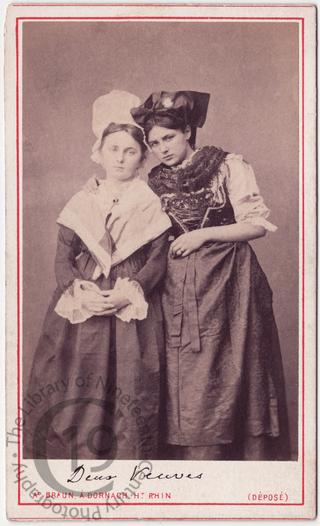
Women of Alsace-Lorraine
A carte-de-visite portrait of two pretty, young women from Alsace-Lorraine in Eastern France, seen here wearing the traditional costumes of their regions. An inked inscription recto in the lower margin reads ‘Deux veuves’ [two widows] and another verso in the same hand reads ‘Deux veuves / L’Alsace et le Lorraine’. Below this a third inscription reads ‘Paris July 1874’. Despite the inscriptions, I don’t think the costumes of the women indicate widowhood but only the locations from which they hailed.
Photographed by Adolphe Braun of Dornach.
Adolphe Braun was born at Besançon in 1811. He first trained as a textile designer and after a couple of false starts in Paris, he opened his own studio at Dornach, a village on the southern outskirts of Mulhouse in Alsace [Eastern France], hard by the German and Swiss borders. His business proved so successful that at one point he was employing a staff of 40 designers, and he only turned to photography in 1853, when he produced a series of some 300 still-life studies of flowers, entitled Fleurs photographiées. Originally intended as designs for wallpaper and as an aid to designers in the fabric and porcelain industries, these were immediately recognized as an artistic achievement in their own right. One album of the photographs was presented to the Empress Eugénie, and the work met with such success at the 1855 Exposition Universelle that Braun left the field of design for photography.
By the 1860s, Braun’s output was primarily topographical. He invariably travelled with teams of assistants, mounting ambitious photographic expeditions in France, Germany and Switzerland, the results of which were sold as series. Many of these views were also available as stereoscopic cards and these brought him considerable financial success. From 1866, he began to photograph works of art in Europe’s great museums, often printing these in the more permanent carbon process, the better to render the tonality of the originals. After his death in 1877, the studio continued in the hands of his son, Gaston.
Code: 125202




